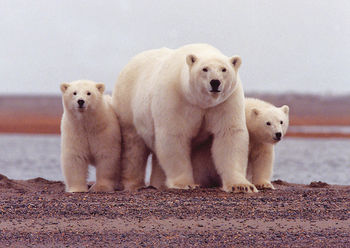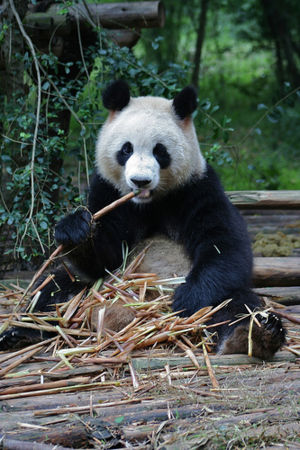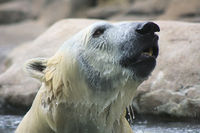Bear (animal): Difference between revisions
Jump to navigation
Jump to search



imported>John Stephenson (disambig) |
mNo edit summary |
||
| (3 intermediate revisions by 2 users not shown) | |||
| Line 2: | Line 2: | ||
{{dambigbox|the animal|Bear}} | {{dambigbox|the animal|Bear}} | ||
{{Image|Polar-bear-cubs.jpg|right|350px|Female [[polar bear]] and cubs at the [[Beaufort Sea]]. Polar bears are the largest [[species]] of bear.}} | {{Image|Polar-bear-cubs.jpg|right|350px|Female [[polar bear]] and cubs at the [[Beaufort Sea]]. Polar bears are the largest [[species]] of bear.}} | ||
'''Bears''', scientifically classified within the ''' | '''Bears''', scientifically classified within the '''Ursidae''' [[family (biology)|family]], are a group of eight [[mammal]]ian [[species]]. The [[black bear]], [[brown bear]] and [[polar bear]] make up the [[genus]] ''[[Ursus]]'', with the polar bear being the largest species of bear in the world. Bears are carnivorous or omnivorous and [[hibernation|hibernate]] to varying degrees, though the [[Giant Panda]] does not hibernate and eats mostly [[bamboo]]. | ||
{{Image|Panda.jpg|right|300px|A [[Giant Panda]] eating [[bamboo]] at the [[Chengdu]] Research Base of Giant Panda Breeding, [[Sichuan]] province, China.}} | |||
Bears are found across [[Europe]], [[Asia]], [[North America]] and [[South America]]. The [[sun bear]] of [[South-East Asia]] is the world's smallest bear, and the [[spectacled bear]] is the only bear found in South America. Polar bears are found at the [[Arctic]], while black and brown bears inhabit North America and [[Eurasia]]. | |||
{{Image|polar-bear-head.jpg|right|200px|Polar bears can spend lengthy periods in water as they search for food.}}[[Category:Suggestion Bot Tag]] | |||
Latest revision as of 11:00, 17 July 2024
This article is about the animal. For other uses of the term Bear, please see Bear (disambiguation).

(CC) Photo: Charles Young
Female polar bear and cubs at the Beaufort Sea. Polar bears are the largest species of bear.
Female polar bear and cubs at the Beaufort Sea. Polar bears are the largest species of bear.
Bears, scientifically classified within the Ursidae family, are a group of eight mammalian species. The black bear, brown bear and polar bear make up the genus Ursus, with the polar bear being the largest species of bear in the world. Bears are carnivorous or omnivorous and hibernate to varying degrees, though the Giant Panda does not hibernate and eats mostly bamboo.

(CC) Photo: Richard IJzermans
A Giant Panda eating bamboo at the Chengdu Research Base of Giant Panda Breeding, Sichuan province, China.
A Giant Panda eating bamboo at the Chengdu Research Base of Giant Panda Breeding, Sichuan province, China.
Bears are found across Europe, Asia, North America and South America. The sun bear of South-East Asia is the world's smallest bear, and the spectacled bear is the only bear found in South America. Polar bears are found at the Arctic, while black and brown bears inhabit North America and Eurasia.
